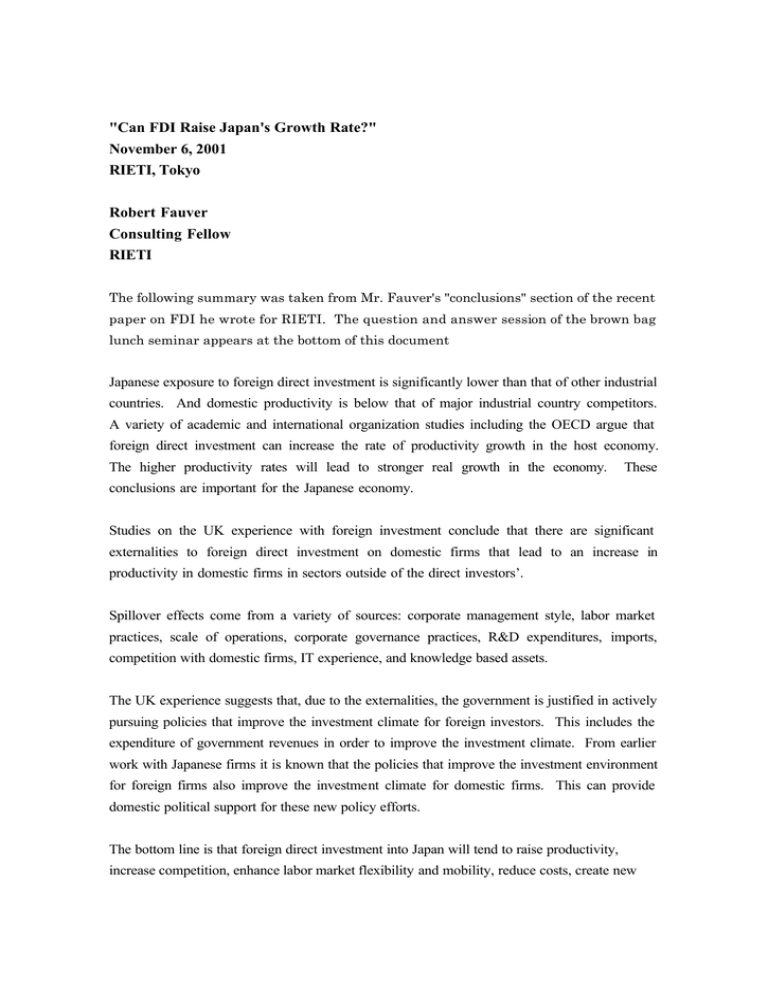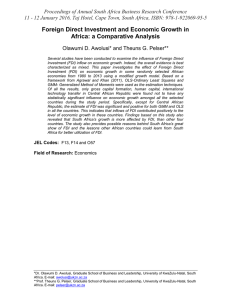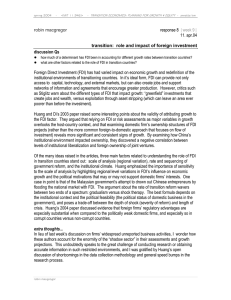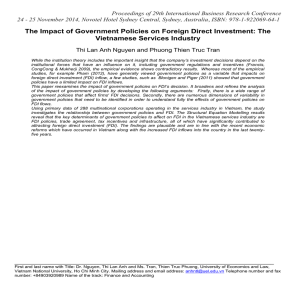"Can FDI Raise Japan's Growth Rate?" November 6, 2001 RIETI, Tokyo
advertisement

"Can FDI Raise Japan's Growth Rate?" November 6, 2001 RIETI, Tokyo Robert Fauver Consulting Fellow RIETI The following summary was taken from Mr. Fauver's "conclusions" section of the recent paper on FDI he wrote for RIETI. The question and answer session of the brown bag lunch seminar appears at the bottom of this document Japanese exposure to foreign direct investment is significantly lower than that of other industrial countries. And domestic productivity is below that of major industrial country competitors. A variety of academic and international organization studies including the OECD argue that foreign direct investment can increase the rate of productivity growth in the host economy. The higher productivity rates will lead to stronger real growth in the economy. These conclusions are important for the Japanese economy. Studies on the UK experience with foreign investment conclude that there are significant externalities to foreign direct investment on domestic firms that lead to an increase in productivity in domestic firms in sectors outside of the direct investors’. Spillover effects come from a variety of sources: corporate management style, labor market practices, scale of operations, corporate governance practices, R&D expenditures, imports, competition with domestic firms, IT experience, and knowledge based assets. The UK experience suggests that, due to the externalities, the government is justified in actively pursuing policies that improve the investment climate for foreign investors. This includes the expenditure of government revenues in order to improve the investment climate. From earlier work with Japanese firms it is known that the policies that improve the investment environment for foreign firms also improve the investment climate for domestic firms. This can provide domestic political support for these new policy efforts. The bottom line is that foreign direct investment into Japan will tend to raise productivity, increase competition, enhance labor market flexibility and mobility, reduce costs, create new financial products, reduce government expenditures, and raise real growth rates. Any policy changes that the government could undertake to encourage foreign direct investment or to make the investment environment (for both domestic and foreign investors) more attractive should be implemented as soon as possible. Question and Answer Q: The Hubert and Pain study on the UK focuses on manufacturing, but FDI in Japan goes to services. Will FDI in services have the same effect on growth? Robert Fauver If you include retail, there is evidence in Japan that FDI has lowered costs for consumers. Lower prices mean money is freed up and can be spent elsewhere. Also changes in the banking system would directly affect the cost of capital. The use of innovative market technology can affect the source of capital to get money from the savers to where the capital is needed. At the moment, the capital market is not working in Japan. Q: The number of people working in foreign affiliates in Japan is on par with the US and other OECD countries. So in terms of employment, FDI penetration is on the same level as other developed countries, but why is FDI so low in Japan? Japan has high costs, in labor and land particularly. How can Japan lower these costs? Do the keiretsu industrial groups deter or impede new entrants? Robert Fauver The government authorities can reduce costs by changing the regulatory environment, changing the tax system, or undertaking regulatory change to reduce information technology costs. On land, the market is so thin that it is hard to know what the market price really is. Land-use policies would also affect cost. Expensive land would be OK if the price were predictable and transparent, and if other things outweighed the price factor, such as being able to access a highly educated, skilled labor pool. About keiretsu, it is too easy to generalize negatively. Long-term relationships can be good and healthy. But if the relationship is held together by non-economic reasons, the investor loses. Historically, the keiretsu made it nearly impossible to do takeovers (or M&A) because there was not enough stock available at a reasonable price. Q: You may apply the UK story to Japan because the UK is a window to Europe. But I am skeptical on whether Japan can be a window to Asia. Rather, companies are investing in China. The "shock" approach may be good for Japan, but how do we change Japan's inward-looking-ness? Robert Fauver I am bullish on Japan for the long-term. The Japanese people, with political leadership, can adapt. About the next three years, however, I am worried. The level of bank restructuring and re-capitalization on Japanese industries over the next three years will determine what Japan looks like in 2020. As for the window on Europe, I would argue that it was Ireland, not England. Ireland used aggressive tax breaks to lure investors. My paper on FDI, however, looks at what FDI did to the UK, not why the FDI went there. Europe is more similar to the UK than Asia is to Japan in terms of development. So the UK was able to be within the tariff wall with similar cost structures. The US is sometimes inward looking too. During the 1960s and 1970s, trade was seen as a residual in the US. But the level of looking inward or looking outward is cyclical in the US and in Japan. In Japan, however, the cycle is about 50 years long. Q: It is important to note that FDI is coming to Japan at a time when domestic investment is dropping. China is very attractive as a destination for FDI. What is China's policy? Robert Fauver It is not the policies of the Chinese government that is attracting the FDI; it is the huge market, the undervalued currency, and the underused, cheap labor. No one can afford to ignore the sales potential in China. So far, up to China's accession to the WTO, companies did FDI in China to sell their products there. The WTO accession may change this. China will be attractive for its cheap labor. Inside five years, however, it will be time for China to change its exchange rate regime. Q: Labor is a serious issue in Japan. There is 5.3% unemployment. FDI sounds like increasing productivity, which also sounds like more layoffs. Companies believe that FDI means more restructuring rather than more jobs. Many believe that it would be less costly to maintain these employees rather than move them over to the unemployment market (welfare). Robert Fauver The productivity boom in the US, during the 1990s, produced the longest and strongest growth, and the lowest unemployment in 40 years. Higher productivity produced faster growth with low inflation. Higher productivity means higher output with the same labor force. It is up to the government to retrain the people and provide a safety net. I would rather see mom and pop retire now to make room for the kids to get jobs. Q: Everything is expensive in Japan compared to in China. Robert Fauver Demand for infrastructure in China is rising. China is underdeveloped in roads, ports, telecommunications, and electrification. Cost structures will rise in China. Using good ideas are a good way to compete. Q: What is the core of Japan's tax problem? Robert Fauver The Japanese tax authorities are not macroeconomists: they are revenue maximizers. The tax people have wanted to increase taxes when Japan's growth was declining in order to maintain revenue. They do not understand Keynesian automatic stabilizers. Japan has not realized the benefits of consolidated taxation. So firms keep different sets of books for accounting and taxes. This is a waste of human capital. It is true that Japanese tax revenue to GDP is among the lowest in the G-7 countries. But the problem is the tax structure. Tax enforcement may also broaden the base.






